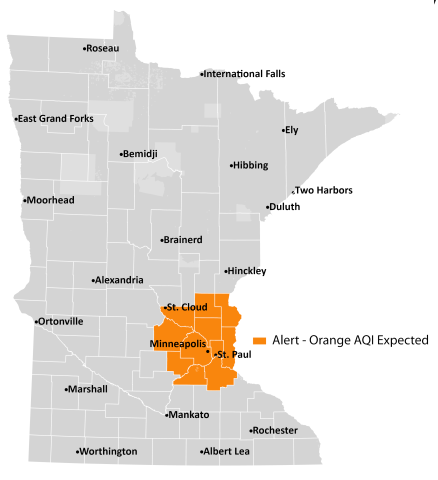Air quality is expected to reach orange in the Twin Cities Metro area and surrounding counties, which is considered unhealthy for sensitive groups.

The Minnesota Pollution Control Agency (MPCA) has extended an air quality alert for central Minnesota. The alert runs until Wednesday, Jan. 11, at Midnight.
The alert that was in effect for areas outside of the Twin Cities Metro will still expire at 6 p.m. on Wednesday, Jan. 11.
A cold front currently moving across Minnesota will disperse fine particle pollution across central Minnesota. Air quality observations have indicated that the dispersion process has been lagging by several hours following the cold front and the air quality alert has been extended until Midnight to account for these trends.
Fine particle levels are expected to remain in the orange air quality index (AQI) category, a level considered unhealthy for sensitive groups, across the Twin Cities Metropolitan Area and surrounding counties. This area includes Minneapolis, St. Paul, Bloomington, Richfield, Woodbury, Blaine, Eden Prairie, Prior Lake, Shakopee, Elk River, Monticello, St. Michael, Isanti, and the tribal nation of Prairie Island. In the orange area, sensitive groups should avoid prolonged time outdoors.
What this alert means
The air quality index (AQI) is color-coded. Air quality alerts are issued when the AQI is forecast to reach an unhealthy level, which includes forecasts in the orange, red, purple, and maroon categories. For a full description of each air quality category, visit airnow.gov.
Orange air quality: Unhealthy for sensitive groups
- Sights and smells: In areas where air quality is in the orange AQI category due to stagnant air, the air may look hazy.
- Health effects: This air is unhealthy for sensitive groups and pollution may aggravate heart and lung disease as well as cardiovascular and respiratory conditions. Symptoms may include chest pain, shortness of breath, wheezing, coughing, and fatigue.
- What to do: People in sensitive groups are encouraged to reduce outdoor physical activities, take more breaks, or do less intense activities to reduce their exposure. People with asthma should follow their asthma action plan and keep their rescue inhaler nearby.
Who’s most at risk
Poor air quality impacts health. Fine particle pollution from air mass stagnation can irritate eyes, nose, and throat, and cause coughing, chest tightness, shortness of breath, dizziness, or fatigue. Fine particles are small enough that they can be breathed deeply into lungs and enter the bloodstream. This can lead to illnesses such as bronchitis or aggravate existing chronic heart and lung diseases, triggering heart palpitations, asthma attacks, heart attacks, and strokes.
Certain groups experience health effects from unhealthy air quality sooner than others, either because they are more sensitive to fine particle pollution or because they are exposed to larger amounts of it.
Sensitive groups include:
- People who have asthma or other breathing conditions like chronic obstructive pulmonary disease (COPD)
- People who have heart disease, high blood pressure, or diabetes
- Pregnant people
- Children and older adults
People with increased exposure include:
- People of all ages who do longer or more vigorous physical activity outdoors
- People who work outdoors, especially workers who do heavy manual labor
- People who exercise or play sports outdoors, including children
- People who don’t have air conditioning and need to keep windows open to stay cool
- People in housing not tight enough to keep unhealthy air out, or who do not have permanent shelter.
Anyone experiencing health effects related to poor air quality should contact their health care provider. Those with severe symptoms, chest pain, trouble breathing, or who fear they may be experiencing a heart attack or stroke should call 911 immediately.
Stay informed
- Visit MPCA’s Air Quality Index webpage for information on current air quality conditions in your area.
- Sign up for daily air quality forecasts and alert notifications by email, text message, phone, or the Minnesota Air mobile app.
- Visit our Air quality and health webpage for information about health and indoor and outdoor air quality
- What you can do about air pollution